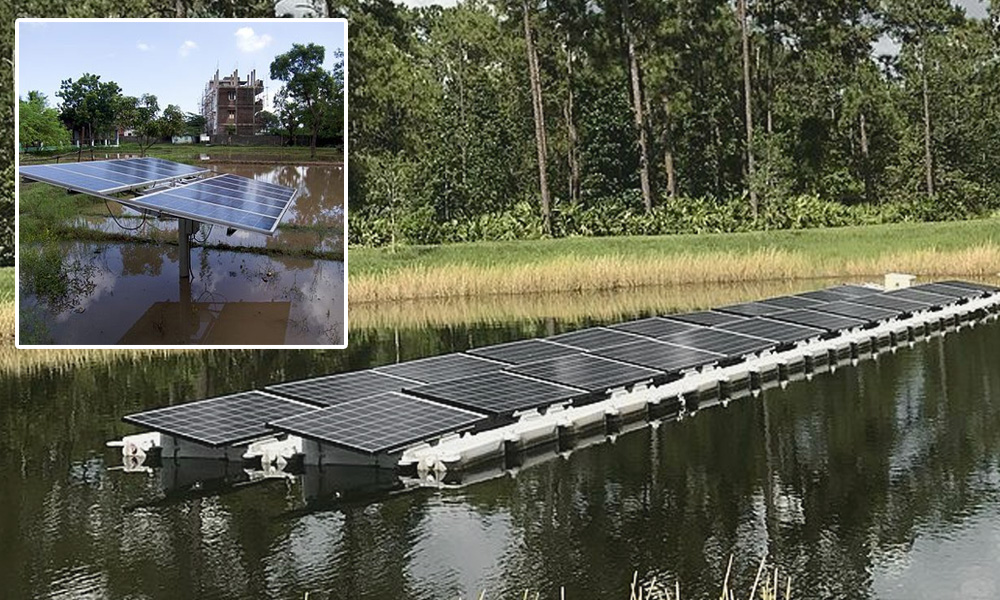
Image Credits: Mongabay
Govt's Plan To Install Solar Panels On Water Bodies Draws Flak From Environmentalists
Writer: Devyani Madaik
A media enthusiast, Devyani believes in learning on the job and there is nothing off limits when it comes to work. Writing is her passion and she is always ready for a debate as well.
India, 17 March 2021 10:45 AM GMT | Updated 17 March 2021 11:03 AM GMT
Editor : Rakshitha R |
Rakshitha an engineer turned passionate journalist with an inclination for poetry, creative writing, movies, fiction, mountains and seclusion. Not a part of the social process but existential.
Creatives : Abhishek M
" An engineer by profession, Abhishek is the creative producer of the team, graphic designing is his passion and travelling his get away. In more ways than one, he makes the content visually appealing."
Experts said that solar panels on water bodies could block sunlight, further decreasing photosynthetic activities inside the water. It will lead to a low rate of photosynthesis and loss of microscopic plants, aquatic plants, and less Dissolved Oxygen inside the water body.
As India's ambitious target to achieve 100 GW solar energy by 2022 draws nearer, the government after spanning agricultural lands, obscuring wastelands, rooftops etc has now turned towards the aquatic system with a new wave of floatovoltaics ( floating photovoltaics).
Floatovoltaics is a new way of solar installation. These panels are mounted on water bodies to provide clean energy and reportedly resolve wastewater management issues.
Earlier in January, the Madhya Pradesh government had announced the world's largest floating solar energy plant of 600 megawatts (MW) capacity in the backwaters of Omkareshwar dam reservoir on the Narmada river in Khandwa district. Reportedly, the project, with an estimated investment of ₹3000 crores, will begin power generation by the year 2022-23.
While all this is in the initiation process, experts have alerted about floatovoltaics' impact on water bodies and their ecosystems. According to the researchers and freshwater ecologists, the solar panels can block sunlight from penetrating the water bodies, further disrupting the thermal gradient, both in the lateral and longitudinal direction, reported Mongabay.
"For an ecosystem to function, its structure should be left intact. The spatial extent of the solar panels can alter the amount of sunlight entering the system. This can interfere with the various food chain and biogeochemical cycles (water cycle, carbon cycle, nitrogen cycle) of the aquatic ecosystem. Floatovoltaics is an ad-hoc solution, which will prove to be unsustainable in the long run," the media quoted T. V. Ramachandra, coordinator, Energy & Wetlands Group, Centre for Ecological Sciences, Indian Institute of Science (IISc).
Aquatic ecologist, Vidyadhar Atkore, explained how less sunlight would decrease photosynthetic activities inside the water. It will lead to a low rate of photosynthesis and loss of microscopic plants, aquatic plants, and less Dissolved Oxygen (DO) inside the water body.
The dying plants further impact aquatic fauna and the herbivorous animals that feed on them. Loss of aquatic fauna also affects migratory and resident birds' feeding habitat, explained Atkore.
Other concerns with the floating solar panels include temperature variation, low DO, anaerobic decomposition, prolonged stratification, impact on aquatic life, migratory and resident birds, the media reported. Stratification affects water quality and increases contaminated loads.
The aquatic system multiplies under ideal temperature, and the presence of solar panels on the surface can alter the temperature profile and result in adverse impacts on the ecosystem.
The media quoted a recent study by UK and US researchers, that states floatovoltaics might also interfere with the interaction between the water body and the atmosphere, causing deep-water anoxia (absence of oxygen) and resulting in phosphorus release from bed sentiments.
"Phosphorus is found in sediment beds naturally and is released in the water at a much slower rate. In the absence of oxygen, the sediment starts releasing phosphorus. It is the most growth-limiting nutrient for aquatic plants that can impact the food web if available in excess quantity. It can lead to algal bloom and large aquatic plants' growth, bringing down the dissolved oxygen level. High amounts of algae growth can also release an algal toxin which can be harmful to animal and human health," Atkore told the media.
Due to the reduced sunlight, the floating solar panels can also cause uneven surface heating in large areas and affect plant growth in the areas where the sunlight penetrates the water body, allowing aquatic plants to grow. Both hydrological changes and a reduced amount of sunlight could have severe ecological consequences.
The effects are highly uncertain and depend on the water body form and the floatovoltaics architecture as well.
Beneficial Or Overhyped?
Experts supporting the solar panel in water bodies lay the benefits of floatovoltaics. Some of them include land neutral characteristics, reduction in water evaporation, and less algal growth.
The supporters argue that achieving the target of 100GW by 2022 seems impossible, given slow progress in the land acquisition process with several obstacles, making land-based solar plants non-feasible.
However, researchers who differ said that building rooftops must be used to their full potential and cover wastelands. "It will not only cool the overheated rooftops down but will also bring down the land requirement. Why take over natural places when we have massive institutions and buildings next to these water bodies?" Veena Srinivasan, Fellow, Ashoka Trust for Research in Ecology and the Environment (ATREE), told the media.
Secondly, since they are on water surfaces, it would help reduce evaporation by covering the surface and limiting interaction with the wind. However, other researchers said that evaporation is essential to complete the aquatic system's evapotranspiration cycle for smooth functioning. Therefore, reduction in evaporation is rather damaging to aquatic ecosystems as well as humans.
Another point under the list of benefits includes reducing algal growth, as the panels would provide shade. However, several studies have shown that it varies widely in its characteristics and sensitivity level.
However, many have opposed, calling the claims shallow and without any long-term scientific studies. All the factors must be taken into account before deploying the panels. The installation should take place after analyzing the depth profile and the physical features of the water bodies.
Also Read: Karnataka: WAQF Board Bans Use Of Loudspeakers Between 10 PM To 6 AM During Azaan
 All section
All section














